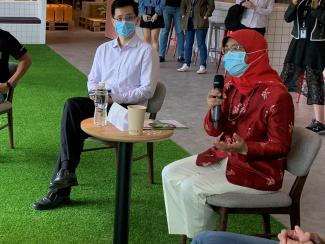
In a recent report by the team from SMU’s Lien Centre of Social Innovation (LCSI), ten per cent of Singaporean households experienced food insecurity at least once in the last 12 months. “The Hunger Report” which was commissioned by The Food Bank Singapore, looked into the prevalence, causes and consequences of food insecurity in Singapore.
A total of 1,206 usable surveys were collected from Singaporean households between July and December 2019 for the study. The findings revealed that food-insecure households were more likely to reside in 1- and 2-room HDB homes compared to food-secure households. Food-insecure families tended to have heads of households with lower educational qualifications than food-secure families. Only 22% of food-insecure households were currently receiving food support. A substantial percentage of food-insecure participants did not seek food support, citing embarrassment, being unaware of available food support and the belief that others need it more than themselves. Food insecurity was also associated with both physical and mental health detriments. Food-insecure participants were more likely to be in the high-risk BMI category compared to food-secure participants. Food-secure households had significantly fewer affiliations with food-insecure households compared to those who were food-insecure.
Recommendations to improve the food insecurity situation included more strategic coordination of food support on a national level, increasing the level of awareness about food insecurity in Singapore, and prioritising nutritious and healthy eating among Singapore households.
To continue its mission to drive social consciousness and enable partnership-driven innovation, LCSI joined The Food Bank Singapore during President Halimah Yacob’s visit to their premises on 15 October. Researchers of “The Hunger Report”, Dr Dalvin Sidhu and Dr Tania Nagpaul presented the full findings of the study to the President, volunteers and beneficiaries.

The guests also learnt more about technology-enabled initiatives to address the issue of food insecurity and food waste in Singapore. More than 360 organisations and 250,000 individuals currently benefit from food collection and redistribution services provided by a network of volunteer groups.
The findings and recommendations of the Hunger Report were also shared with other food support organisations through a virtual session later the same day. The Q&A segment saw an engaging discussion between the participants on current issues faced in the food distribution sector.

Through these activities, LCSI aims to give voice, empower and enable socially conscious individuals and organisations to learn, ideate and collaborate.